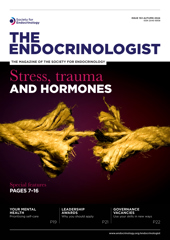- SfE BES Conference
- Joint Irish-UK Endocrine Meeting
- Aspiring Research Leaders
- Women's Health Summit
- Clinical Update
- Endocrine Nurse Update
- Thyroid Ultrasound
- National Clinical Cases
- Bitesize webinars
-
- Engaging the patient asynchronously
- Difficult consultations and unpopular decisions
- Consultant in a new era
- How to approach ACTH-dependent Cushing’s now there’s no CRH
- Digital Health and Pathways
- Opportunities for advancing your career: Advanced Clinical Practice (ACP) and Health Education England credentialing
- What clinicians need to know about use of Telehealth for outpatient endocrine care
- Nurse led services for Clinicians/all healthcare professionals
- Bitesize webinar: Transition in Endocrinology
- Integrated pathways
- Bitesize webinar: Advice & Guidance and Patient-initiated follow-up
- Bitesize webinar: Non-functioning pituitary microadenomas: how to deal with them
- Virtual Coffee Chats
-
- Virtual Coffee Chats
- Registration
- Virtual Coffee Chat: Building and maintaining industry partnership
- Virtual Coffee Chat: Engaging the Public with Science
- Virtual Coffee Chat: Developing and Managing an Endocrine Nurse team- creating business cases, establishing job plans and roles (Early Career)
- Virtual Coffee Chat: Developing and Managing an Endocrine Nurse team- creating business cases, establishing job plans and roles
- Virtual Coffee Chat: Pursuing academia alongside clinical practice
- Virtual Coffee Chat: Nurse involvement in clinical guideline development
- Publishing your research in a journal – ask a publisher anything
- Virtual Coffee Chat: Grants Clinic
- Virtual Coffee Chat: Grants Clinic with Dr Marika Charalambous
- Virtual Coffee Chat: Patient doctor communication in Diabetes – barriers and solutions
- National Training Scheme for the Use of Radioiodine in Benign Thyroid Disease
- National Endocrinology and Diabetes Taster Sessions
- Oxford Endocrine Masterclass
- NET Models
- Endocrine Genetic Testing
- Webinars
-
- From aspiration to achievement: celebrating women in endocrinology for International Women's Day
- Case discussions from a young adult endocrine clinic (non-promotional supported webinar)
- From concept to evaluation: Building effective academic modules in endocrinology
- The ‘ultra’ in processed – is ultra processed food a useful concept?
- What you need to know about the new Adrenal Insufficiency NICE guidelines
- What are endocrine disrupting chemicals and why we need better regulation to protect our health
- Why you need to know about online health misinformation
- Up to date diagnosis and management of hypothyroidism
- Reproductive Endocrinology
- Obesity Update
- Hormone Dependent Cancer
- Thyroid Education Day
- What is endocrinology?
- History of the Society
- Governance
-
- Apply for a role within your Society
- Society for Endocrinology Council
- Awards and Prizes Committee
- Clinical Committee
- Corporate Liaison Committee
- Events and Training Committee
- Finance Committee
- Grants Committee
- Nurse Committee
- Programme Committee
- Public Engagement Committee
- Science Committee
- Society governance review
- Annual reports and financial statements
- Our activities
- Equality, Diversity and Inclusion
- Our policies
- Who's who
- Work with us
- Donate to your Society
- Privacy
- Society strategy 2024 - 2027
- Summer 25
- Spring 25
- Winter 2024
- Autumn 2024
- Summer 2024
- Spring 2024
- Winter 2023
- Autumn 2023
- Summer 2023
- Spring 2023
- Winter 2022
- Autumn 2022
- Summer 2022
- Spring 2022
- Winter 2021
- Autumn 2021
- Summer 2021
- Spring 2021
- Winter 2020
- Autumn 2020
- Summer 2020
- Spring 2020
- Winter 2019
- Autumn 2019
- Summer 2019
- Spring 2019
- Winter 2018
- Autumn 2018
- Summer 2018
- Spring 2018
- Winter 2017
- Autumn 2017
- Summer 2017
- Winter 2016
- Autumn 2016
- Summer 2016
- PDF Archive
- Endocrinologist Search






